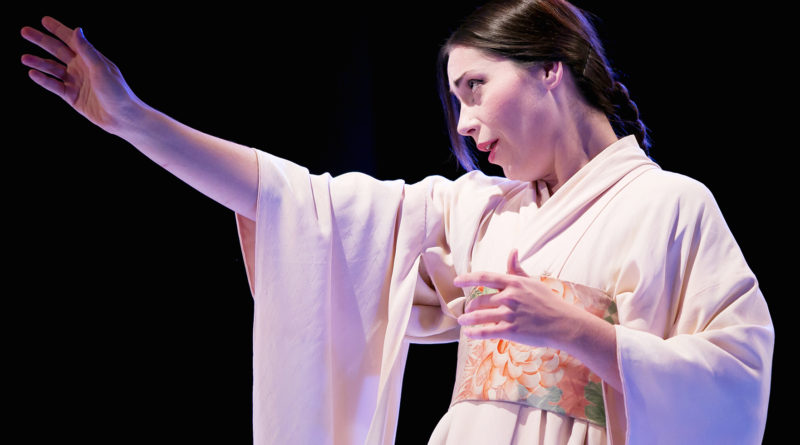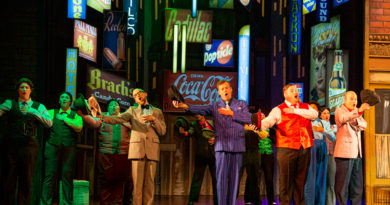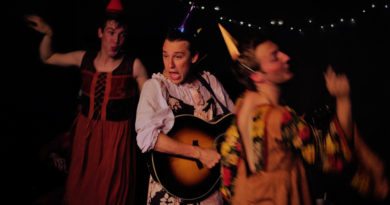Madame Butterfly
This is not a review per se as I wasn’t supposed to be reviewing the show Madame Butterfly at The Tobacco Factory on Friday, but I have been asked by Vivienne to write down my thoughts to compliment the review by Becky Condron.
I’m not going to go over the storyline or talk about the company who performed Madame Butterfly, if you want to know this, then read Becky’s review. However, when we left the theatre, I believed that Becky and myself were coming from completely different places with how this opera made us feel. On reading her review, I realised we were coming from the same place in a lot of ways but that it just provoked strong, differing reactions.
My heart was broken several times during the performance. Madame Butterfly, so young, so lacking in choices or possibilities because of the world she was born into. Losing her father at such a young age in such tragic circumstances. My own past experience meant I could very much relate to her because of that. Yes, I felt angry at the patriarchy for creating that world she inhabited, that she never fought against. But sometimes, if you don’t know any other way, how can you fight it? She came to love the man who took her as his wife, despite her tender age of 15. Just a child. Perhaps her love was misguided and not really real. Perhaps if she had been given the chance to find love for herself, she would have been able to truly appreciate what love was. But, she did love him. Longed for him when he was gone. A scene plays out where Madame Butterfly is alone on the stage, poised in her wedding gown awaiting the arrival of her love after his ship came in. He had been away 3 years, and she had born his child. The music from the orchestra illustrated for me the turmoil she was going through, trying to wait patiently for him. Seeming to be patient in her quiet stillness. Probably going mad with desire for him to come through the door, wanting him so badly but not getting her wish. I felt the moment her heart broke after she discovered his new wife and that he was not returning for her. I knew before she did that they had returned to take her child away from her, to give him a ‘better’ life. I wanted to shout out, beg them not to take away her baby and break her heart for the second time, and break it in a way that would not be repaired. When she killed herself, I felt angry with her for doing that to her child, doing to him what her own father had done to her. But I felt so sad that her world had made her feel that this was her only choice. I also felt extremely grateful that I was born into the world and era I have been. I felt angry about the treatment of women throughout history. That it was seen as acceptable, as noble even that a child could be bought, even if this was to save her from a life of prostitution. But with an awareness of how many women remain in forced servitude, are forced to work in the sex trade, who are oppressed by things that either are, or seem beyond their control in the world we live in today. In the country I am fortunate enough to live in.
Despite all this, the character who broke my heart the most was Suzuki, the loyal handmaid of Butterfly. I remember early on the jolt I felt when she was introduced to the soon to be husband of Butterfly and he was told she had dedicated her life and love to servitude. She was the sort of woman men would immediately dismiss. Perhaps the love Madame Butterfly experienced was not real, was unsatisfactory and then broke her heart. But at least she had the chance to love, whereas Suzuki had not, and probably would not. A life without love in it, even love that breaks your heart? Unthinkable! I felt the saddest and angriest of all for Suzuki, and raged against her imprisonment in a world that offered her so little.
With my reviewing head on, I would have preferred the opera NOT to have been translated into English. Much as the language allowed me to better understand the storyline, it was jarring at times as it took away from the beauty of the music. I didn’t love this production; I thought I did at the time as I was so swept up in the story. But what it has done is made me want to seek out more opera, to discover what I like about it and don’t like. I feel grateful that I have been opened up to it. And, most of all, it made me fondly remember my Dad. A working class Irish boy, the sort of person who might have felt like opera was too highbrow for him. But he didn’t. Opera was a genre of music I grew up with, as he really loved it, amongst a myriad of other musical genres too. I smiled at the memory of him loudly singing Pavarotti’s ‘Nessun Dorma’ in the garden, sunbathing and plugged into his Walkman. He really, really was a bad singer, but he used to give it his all! Perhaps my familiarity with this art form made it easier to watch. Becky? You shouldn’t feel angry at yourself if you felt you didn’t ‘get’ it. I don’t think it is about ‘getting’ it, you either like it or you don’t, it either moves you or it doesn’t and either response is OK, because of that old cliché. Something to do with the world being richer because of us all experiencing it in different ways and liking different things. But the irony is that, in my opinion, by translating something into English that is meant to be in Italian in order to give it a wider appeal, makes it rather LESS appealing. Or maybe that is just me!
I feel grateful I am able to watch things like this, thanks to the generosity of my friends. I never take it for granted that I have the chance to see performances, good, bad, indifferent or amazing. And one that sparks the kind of debate and thought this performance did? Yeah, I’m really lucky.
By Karen Blake





